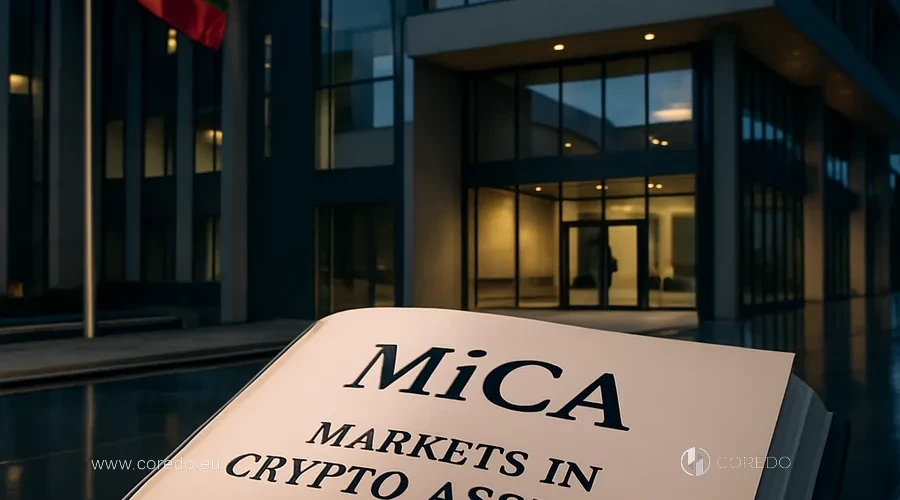In 2026 Lithuania found itself at the center of attention in the European crypto market: according to the European Commission, in just the last year the volume of crypto-asset transactions in the country grew by more than 120%. This is not just a statistic: it is a challenge for anyone building or scaling a crypto business in the EU. Why? Because from 2026 cryptocurrency regulation in Lithuania is changing radically: MiCA (Markets in Crypto-Assets) comes into force, and national rules are becoming stricter and more transparent than ever before.
Today entrepreneurs face not only the need to register a crypto company in Lithuania, but also new requirements for licensing, capital, AML and corporate governance. A mistake at any stage, and a business risks losing access to EU markets, facing sanctions or fines, and in the worst case – being excluded from the legal field.
Are you ready for these changes? How can you use the CASP transitional period not only to survive but to gain a competitive advantage? What steps will ensure the transparency and security of crypto-asset operations in Lithuania in 2026?
In this article I, Nikita Veremeev, founder of COREDO, share practical strategies and the experience of our team so that you not only understand the essence of the changes, but also get a step-by-step guide to adapting to the new rules. Read to the end; you will find not only answers to pressing questions, but also tools to grow your crypto business in the new regulatory reality.
Changes in crypto regulation in Lithuania 2026

The year 2026 became a point of no return for the crypto asset industry in Lithuania. The entry into force of MiCA in Lithuania and national amendments completely reshaped the approach to licensing, registration and supervision of crypto businesses. Key changes affected not only legal entities but all crypto asset service providers (CASP and VASP).
- MiCA in Lithuania: From 2026 all crypto assets and related services are regulated at the EU level under unified standards. This provides transparency, investor protection and a level playing field for all market participants.
- Transition period for CASP in Lithuania: Until 1 January 2026 there was a transitional period that allowed operating companies to adapt to the new requirements without the risk of an immediate shutdown.
- registration of a crypto company in Lithuania 2026: The registration procedure has become stricter – now not only legal formalization is required, but also compliance with new criteria on capital, corporate governance and internal AML policies.
Implementation of MiCA in Lithuania: what’s new?
MiCA is not just another regulation, but a fundamental market overhaul. The main provisions of MiCA that are now mandatory for Lithuania:
- MiCA requirements for crypto companies in Lithuania: Any company providing crypto asset services (CASP, VASP) is required to obtain a license for crypto activities in Lithuania through the national regulator – the Bank of Lithuania.
- Licensing of VASP in Lithuania: Service categories (exchange, custody, portfolio management, advisory) are clearly defined for the first time, and each has specific minimum capital requirements and internal control procedure requirements.
- Unification of rules across the EU: Thanks to MiCA, Lithuania becomes part of the single European market, which simplifies license passporting and entry into the markets of other EU and EEA countries.
Transition period for CASP and its significance
The CASP transition period in Lithuania: it was a unique window of opportunity that ended on 1 January 2026. During this period companies could continue operating under the old rules while bringing their processes into compliance with MiCA.
- How to prepare a crypto business for MiCA requirements in Lithuania: The solution developed at COREDO included an audit of internal policies, updating KYC procedures and implementing transaction monitoring systems.
- Consequences of the end of the transition period: From 2026, lack of a license or non-compliance with new requirements leads to immediate suspension of activities and the risk of large fines.
Crypto Business Licensing in Lithuania under MiCA

С 2026 года лицензия крипто Литва стала обязательным условием для всех, кто планирует оказывать криптоуслуги в Литве 2026 и выходить на рынки ЕС. Банк Литвы выступает единым окном для подачи заявок и осуществляет надзор за соответствием компаний новым стандартам.
- VASP licensing in Lithuania: The process has become digital, transparent and standardized. Now each application undergoes a comprehensive review for compliance with MiCA requirements and national legislation.
- Capital requirements for crypto business in Lithuania: Minimum capital ranges from €50,000 to €125,000 depending on the type of services provided. This is a tightening compared to previous rules.
- The role of the Bank of Lithuania in crypto regulation: The regulator not only issues licenses but also conducts regular supervision, including checks of corporate governance, internal controls and compliance.
- Passporting rights of the license in the EU: A Lithuanian CASP license grants the right to provide services in all EU and EEA countries without the need to obtain additional permits.
How to obtain a crypto license in Lithuania under MiCA?
COREDO’s practice shows that licensing success depends on thorough preparation and understanding of all stages of the process:
- Document collection and assessment criteria: You must prepare the incorporation documents, a business plan, descriptions of internal AML policies, information about beneficiaries and the capital structure.
- Electronic application submission: All documents are submitted through the Bank of Lithuania’s electronic “single window” system, which speeds up the process and minimizes bureaucracy.
- Internal compliance and AML procedures: To obtain a license, it is mandatory to implement compliance standards, appoint a person responsible for AML and develop internal policies for client identification and transaction monitoring.
Capital and corporate governance requirements
MiCA and Lithuania’s national rules of 2026 have tightened capital and corporate governance requirements:
- Minimum capital thresholds: €50,000 for advisory services, €125,000 for custody of crypto assets and portfolio management.
- AML responsible manager: Mandatory appointment of a Lithuania-based resident with experience in AML/CFT.
- corporate governance: Implementation of an internal control system, regular audits, transparent ownership structure.
AML and Financial Crimes in Lithuania’s Crypto Sector

In 2026, Lithuania’s cryptocurrency AML regime reached a new level. The Anti-Money Laundering and Countering the Financing of Terrorism law (AML/CFT) has been integrated with MiCA, and supervision was strengthened by two bodies at once – the Bank of Lithuania and the Financial Crime Investigation Service of Lithuania (FCIS).
- Control of financial crimes in Lithuania’s crypto sector: the FCIS now has expanded powers to monitor operations, investigate suspicious transactions and impose fines.
- Internal AML policies for crypto companies in Lithuania: Every company is required to implement KYC procedures, transaction monitoring and risk assessments.
- The role of the Bank of Lithuania in crypto regulation: the regulator conducts regular inspections, requires reporting and confirmation of the effectiveness of internal AML policies.
Recommendations for AML and CFT Compliance
Effective AML and CFT compliance is not only a legal requirement but also the foundation of trust for customers and partners.
- Organizing KYC and transaction monitoring: Implement multi-level customer identification and regular verification of sources of funds.
- Risk assessment and reporting systems: Use automated tools to analyze transactions and submit timely reports to the FCIS and the Bank of Lithuania.
- Liability for non-compliance: Fines for violating AML standards can reach hundreds of thousands of euros, and in cases of systematic violations license revocation and criminal prosecution are possible.
Crypto business in Lithuania and the EU: new rules

The implementation of MiCA in Lithuania and the national changes has become a catalyst for scaling crypto business in the EU and increasing the sector’s investment attractiveness.
- Scaling crypto business in the EU: a CASP license obtained in Lithuania opens access to EU markets and the EEA, simplifying expansion into new jurisdictions.
- Risks and opportunities: strict capital and compliance requirements raise the barrier to entry but at the same time protect the market from bad actors.
- Comparison of crypto regulation in the EU and Asia: the European approach (MiCA) emphasizes transparency, investor protection and integration with banking infrastructure, while in some Asian countries regulation is less harmonized.
- Impact of MiCA on Lithuania’s crypto ecosystem: the new rules help form a resilient ecosystem, attract institutional investors and foster innovation.
Practical steps for crypto business leaders in Lithuania

In practice, successful adaptation to the new rules requires a systematic approach and attention to detail.
- preparation for licensing and audit: Conduct an internal audit of processes, update documentation, implement automated KYC/AML systems.
- Establishing internal compliance and AML policies: Develop and approve internal control procedures, appoint responsible persons, conduct staff training.
- Strategy for using the CASP transitional period: Use the remaining time to test new procedures, adjust the business model, and prepare for the Bank of Lithuania’s audit.
- Ensuring transparency and security of operations: Integrate your business with the payment infrastructure, use modern monitoring and reporting tools.
- Choosing reliable partners and consultants: COREDO’s experience shows that working with professional consultants can minimize risks and accelerate the licensing process.
Practical recommendations and key takeaways
The year 2026 was a turning point for cryptocurrency regulation in Lithuania. The implementation of MiCA in Lithuania, tightened licensing and AML requirements, and new corporate governance standards are shaping a new reality for the crypto business.
Checklist for launching and running a crypto business in Lithuania from 2026:
- Conduct an audit of business processes and internal documentation.
- Prepare a complete set of documents for CASP licensing.
- Implement modern KYC/AML systems and internal controls.
- Appoint compliance and AML officers and ensure their training.
- Integrate the business with the EU payment infrastructure.
- Ensure transparency and security of crypto asset operations.
- Take advantage of the CASP transitional period for adaptation.
- Work with professional advisors to accelerate the licensing process.
If you are looking for a reliable partner to register a crypto company in Lithuania in 2026, obtain a crypto license in Lithuania, or receive comprehensive support, the COREDO team is ready to offer solutions proven in practice and compliant with the strictest EU standards.
Comparison of MiCA requirements and Lithuania’s 2026 regulations
| Parameter | MiCA requirements | Lithuania’s national rules (2026) | Comments |
|---|---|---|---|
| CASP licensing | Mandatory for all service providers | Process through Lietuvos Bankas, ‘single window’ | Transition period extended until 01.01.2026 |
| Minimum capital | From €50,000 to €125,000 | In line with MiCA requirements | Tightening compared to previously applicable rules |
| AML/KYC | Mandatory procedures, monitoring | Implementation of internal policies and reporting | Supervision by the FCIS and the Bank of Lithuania |
| Corporate governance | Responsible AML manager | Mandatory appointment of a resident responsible person | Increased transparency and oversight |
| License passporting rights | Access to EU and EEA markets | Subject to EU supervision and the national regulator | Lithuania: a hub for crypto business in the EU |